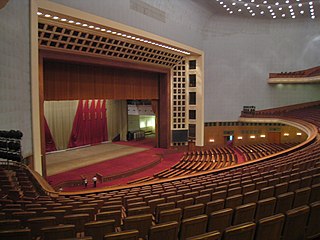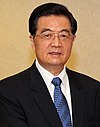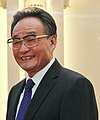
Wen Jiabao is a Chinese retired politician who served as the premier of China from 2003 to 2013. In his capacity as head of government, Wen was regarded as the leading figure behind China's economic policy. From 2002 to 2012, he held membership in the Politburo Standing Committee of the Chinese Communist Party, the country's de facto top power organ, where he was ranked third out of nine members and after general secretary Hu Jintao and Wu Bangguo, chairman of the Standing Committee of the National People's Congress.

Wu Bangguo is a Chinese retired politician. Wu served as the second-ranking member of the Politburo Standing Committee of the Chinese Communist Party from 2002 to 2012, and as Chairman of the Standing Committee of the National People's Congress from 2003 to 2013.
The Shanghai clique, also referred to as the Shanghai gang, Jiang clique, or Jiang faction, refers to an informal group of Chinese Communist Party (CCP) officials who rose to prominence under former CCP General Secretary Jiang Zemin while he served as the party chief and mayor of Shanghai.
The 16th National Congress of the Chinese Communist Party was held in Beijing between November 8 and 14, 2002. It was preceded by the 15th National Congress of the Chinese Communist Party. 2,114 delegates and 40 specially invited delegates attended this and elected a 356-member 16th CCP Central Committee, as well as a 121-member Central Commission for Discipline Inspection (CCDI). The Congress marked the nominal transition of power between Jiang Zemin and Hu Jintao, who replaced Jiang as General Secretary, and a newly expanded Politburo Standing Committee line-up. The institutional transition would be completed in state organs by the 2003 National People's Congress in March. Jiang, however, remained head of the Central Military Commission, therefore in practice, the power transition was not complete. The Party National Congress examined and adopted the amendment to the Constitution of the Chinese Communist Party proposed by the 15th CCP Central Committee, and decided to come into force as from the date of its adoption. An amendment to the Constitution was approved the Party National Congress, with Jiang Zemin's signature ideology of "Three Represents" written into it. This congress was succeeded by the 17th National Congress of the Chinese Communist Party.

Li Keqiang was a Chinese economist and politician who served as the premier of the People's Republic of China from 2013 to 2023. He was also the second-ranked member of the Politburo Standing Committee of the Chinese Communist Party (CCP) from 2012 to 2022. Li was a major part of the "fifth generation of Chinese leadership" along with Xi Jinping, the CCP general secretary.

The Supreme People's Procuratorate of the People's Republic of China is the highest national agency responsible for legal prosecution and prosecutorial investigation in China. The SPP reports to the National People's Congress (NPC).
The 4th Session of the 10th National People's Congress was held in Beijing, China, in conjunction with the 2006 CPPCC. Many items were listed on the agenda for the two-week-long session of the National People's Congress. 2,937 delegates from every province, municipality, and Special Administrative Region were in attendance. The 2006 Session was chaired by Standing Committee Chairman Wu Bangguo.
The 5th Session of the 10th National People's Congress held its annual meeting from March 5 to March 15, 2007 at the Great Hall of the People in Beijing, China, in conjunction with the 2007 CPPCC. Many items were listed on the agenda for the two-week-long session of the National People's Congress. 2,937 delegates from every province and municipality attended, along with representatives from the People's Liberation Army. Among the delegations were those from the Special Administrative Regions of Hong Kong and Macau and a delegation representing Taiwan. Details on the election of these delegations can be found on the main article on the National People's Congress. The 2007 Session was chaired by Standing Committee Chairman Wu Bangguo, with the annual Government Report delivered by Premier Wen Jiabao. The 2007 Session also set the precedent of allowing foreign journalists to approach and interview any NPC members without restriction. All proposals and resolutions from the session for the first time were fully translated into English. The 2007 NPC formally approved the Property Law of the People's Republic of China which had been under discussion for the last several years. Shanghai party chief Chen Liangyu has been suspended and therefore did not participate in the NPC. However, Vice-Premier Huang Ju, who had been widely speculated in the Hong Kong media and Western sources to have fallen into political disgrace, though reported in the Chinese press as having been in bad health, made an appearance at the opening ceremonies on March 5. Huang genuinely appeared ill.

The 17th National Congress of the Chinese Communist Party was held in Beijing, China, at the Great Hall of the People from 15 to 21 October 2007. Congress marked a significant shift in the political direction of the country as CCP General Secretary Hu Jintao solidified his position of leadership. Hu's signature policy doctrine, the Scientific Development Concept, which aimed to create a "Socialist Harmonious Society" through egalitarian wealth distribution and concern for the country's less well-off, was enshrined into the Party Constitution. It was succeeded by the 18th National Congress of the Chinese Communist Party.
The 16th Central Committee of the Chinese Communist Party was in session from 2002 to 2007. It held seven plenary sessions. It was set in motion by the 16th National Congress of the Chinese Communist Party. The 15th Central Committee preceded it. It was followed by the 17th Central Committee of the Chinese Communist Party.
The 1st Session of the 11th National People's Congress held its annual meeting from March 5 to March 18, 2008 in the Great Hall of the People in Beijing, China, in conjunction with the 2008 CPPCC.
Events in the year 2007 in China.

The 2008–09 Chinese economic stimulus plan was a RMB¥ 4 trillion stimulus package aiming to minimize the impact of the financial crisis of 2007–2008 on the Chinese economy. It was announced by the State Council of the People's Republic of China on 9 November 2008. The economic stimulus plan was seen as a success: While China's economic growth fell to almost 6% by the end of 2008, it had recovered to over 10% by in mid-2009. Critics of China's stimulus package have blamed it for causing a surge in Chinese debt since 2009, particularly among local governments and state-owned enterprises. The World Bank subsequently went on to recommend similar public works spending campaigns to western governments experiencing the effects of the financial crisis, but the US and EU instead decided to pursue long-term policies of quantitative easing.

The 11th National Games of China were held in various cities in Shandong from October 16 to October 28, 2009. Represented were 33 sports, 43 disciplines and 362 events, including 4 winter sports which were held in Shenyang, Changchun and Qingdao between January and April 2009.
The 3rd Session of the 11th National People's Congress held its annual meeting in March 2010 at the Great Hall of the People in Beijing, China. The event opened on March 5 and concluded on March 14, 2010.
The 4th Session of the 11th National People's Congress held its annual meeting in March 2011 at the Great Hall of the People in Beijing, China. The event opened on 5 March and concluded on 14 March. The meeting was expected to approve the country's 12th Five Year Plan.
The 5th Session of the 11th National People's Congress held its annual meeting in March 2012 at the Great Hall of the People in Beijing, China. The event opened on 5 March and concluded on 14 March. Premier Wen Jiabao delivered his work report as Premier.

The "Chongqing model" was a series of social and economic policies adopted in the Chinese megalopolis of Chongqing. It is most closely associated with Bo Xilai, who served as the city's Communist Party secretary from 2007 to 2012, though some policies were put in place by Bo's predecessors.

The National People's Congress (NPC) is the highest organ of state power of the People's Republic of China. The NPC is the only branch of government in China, and per the principle of unified power, all state organs from the State Council to the Supreme People's Court (SPC) are subservient to it. With 2,980 members in 2023, it is the largest legislative body in the world. The NPC is elected for a term of five years. It holds annual sessions every spring, usually lasting from 10 to 14 days, in the Great Hall of the People on the west side of Tiananmen Square in Beijing.
The 2013 National People's Congress held its annual meeting in March 2013 at the Great Hall of the People in Beijing, China. The session opened 5 March and concluded on 16 March, 2013 This was the Session in which major state positions were elected.











